Obama’s ISIL AUMF A Convenient (But Necessary) Excuse
Explaining my ambivalence around the latest escalation in our intervention.
My latest for The National Interest, “Obama’s ISIS AUMF: A Convenient (But Necessary) Excuse,” has posted. It explains my ambivalence around the latest escalation in our intervention.
Because the piece was a bit long, the editors edited down my original introduction. I include it here, however, for context:
When President Obama declared last September that he would “degrade, and ultimately destroy, ISIL through a comprehensive and sustained counterterrorism strategy” without the use of American ground combat troops, most observers, myself included, were highly skeptical. Writing in this forum, I observed that it was “simply the logical continuation of Obama’s existing ISIL nonstrategy and, indeed, his general counterterrorism strategy of blowing up the bad guys and hoping they get tired of it eventually,” dubbed it “Whack-a-Mole with no end in sight,” and yet pronounced that “it may well be the best course of action available to us.”
Five months later, the president is asking Congress to authorize him to dramatically escalate the fight, including the use of ground combat troops, ostensibly in very limited numbers with a very limited mission for a very limited period of time. It’s still highly unlikely to be enough to “destroy” ISIL even by technical military definitions. Further, it’s very likely to lead to expanded American involvement down the road.
The portion of the piece that inspired the editors’ choice of title:
Returning to the Constitutional requirement that non-emergency military action be authorized by Congress is a good idea. It’s a position Obama articulated passionately during his brief tenure in the Senate and as a presidential candidate. Yet, it’s worth noting that, since assuming the Oval Office, Obama has been as aggressive as any of his predecessors in finding ways around that inconvenience when it suits him. Aside from wildly escalating the drone war around the globe, during the Libya campaign in 2011 Obama ignored even the modest restrictions imposed on him by the War Powers Resolution, simply declaring that the combat sorties American forces were flying weren’t “hostilities.” The only time he’s actually asked Congress for its blessing to go to war was to give him an excuse to avoid taking strong action against Syria’s Assad for crossing the “red line” of chemical weapons use.
Regardless of the apparent hypocrisy, getting Congress involved is not only consistent with the law of the land but it’s also shrewd politically and important strategically. Self-serving or not, Obama is right when he declares, “we are strongest as a nation when the President and Congress work together.” If we’re to get more heavily involved in this fight against ISIL, there ought to be a public debate and bipartisan approval.
Getting to my ambivalence:
In terms of the policy itself, it’s easy to sympathize with the president’s plight. ISIL is wreaking havoc in a vital and already fragile region and murdering innocents in particularly graphic, public fashion. There’s enormous pressure on him to “do something” and yet very little appetite for the sort of military response that could potentially yield quick, decisive results. So, while I was skeptical that our months-long game of Whack-a-Mole would do the trick, it seemed the least bad option given the reality that there are simply too few local fighters willing to do the dirty work for us, and fewer still who are capable of doing it.
Further, politics aside, the existing approach (I won’t call it a “strategy”) against ISIL is consistent with the constructivist incrementalism that has characterized Obama’s foreign policy.
While, “Our successes will happen in fits and starts, and sometimes there’s going to be a breakthrough and sometimes you’ll just modestly make things a little better” makes for a lousy bumper sticker, it’s a perfectly prudent approach in a world of bad options. And, while there are mixed reports from analysts far better positioned to evaluate the facts on the ground than me, there’s reason to believe things are indeed modestly better in Iraq and Syria than they would otherwise be had we not intervened.
There’s quite a bit more of that before getting to the conclusion:
This seems reasonable on its face. If it’s worth the risks to our air crews to conduct operations with no end in sight, it’s probably worth taking calculated risks with small commando squads if there’s a sufficiently valuable mission that requires their skill set.
At the same time, it’s hardly inconceivable that the man who argued that combat sorties over Libya didn’t constitute “hostilities” would come up with a creative interpretation of “enduring offensive ground combat operations” if he deemed it necessary. For that matter, since the AUMF wouldn’t expire until a year into Obama’s successor’s term if it were passed tomorrow, it might be the next Commander-in-Chief making that call.
Twenty years ago, when the bloom was off the rose of post-Cold War interventionism, the phrase “exit strategy” came into vogue. It was a shorthand for questions like, What will the situation on the ground look like when we’ve accomplished our mission? How will we know when we’ve won, or at least can transition from kinetic military operations to a post-conflict phase?
The bottom line is that I remain very leery of this approach against ISIL—and am moderately concerned about the modest escalation the president is asking for here—but am not sure that there’s a substantially better approach out there. I’m reflexively non-interventionist and, were ISIL merely operating as part of the horrible mishmash that is the Syrian civil war, I’d say it isn’t our fight, beheadings or no. Given that they’re a regional menace, however, ignoring them isn’t an option. So, Whack-a-Mole still strikes me as the least bad course. Aside from uneasiness, I’m not sure whether Whack-a-Mole Plus Special Forces is slightly better or slightly worse.
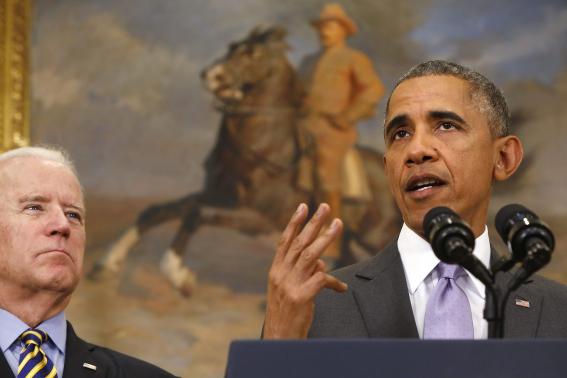

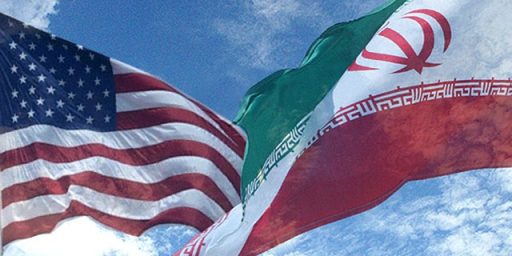
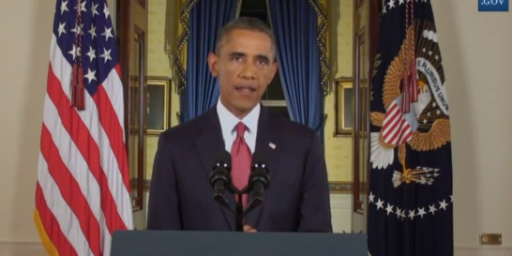
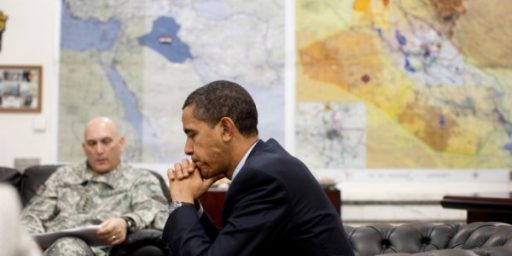

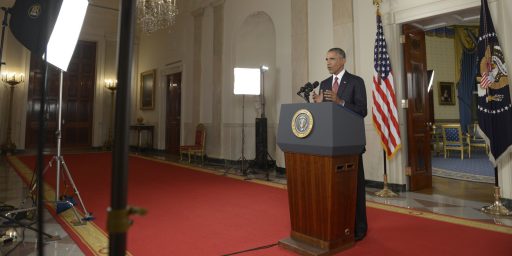
I’m reflexively interventionist on the grounds that I like seeing evil men die. Fortunately for all of us, I’m not president and Mr. Obama is.
I appreciate your conclusion that Obama’s may be the least bad approach. I’ve never liked the “Exit strategy” obsession any more than I like the “Boots on the ground” trope. They’re both catchy phrases that reduce the complex to the simplistic and distract from the goal. As for “Whack-a-mole” that describes any situation that’s chronic. Zoom out a bit and we’ve been playing whack-a-mole with foreign threats since 1776 – the Royal Navy, the Barbary pirates, various Indian nations, Canadians, Mexicans, Germans, Japanese, Russians, Cubans, Koreans, Vietnamese. . . As the great foreign policy expert Roseanne Roseannadanna pointed out, “It’s always something.”
We need to stop being surprised that life doesn’t revert to some bygone era of peace and tranquility. That era never existed. It’s a false memory. We’ve been at war to one degree or another my entire life, and pretty much the entire life of this country. Conflict is the norm. How many more years of conflict lie ahead? Who knows? Maybe Jesus will fly down out of the clouds and bring a thousand years of peace, but more likely we’ll still be getting killed and killing in return forever.
I think we all agree that the best outcome is for the Arab world to begin to manage its own problems. ISIS is our problem, but it’s a lot more Saudi Arabia’s problem, and Jordan’s and Iraq’s. Those are the people who should be managing it, and in order for that to happen we need to stop rushing in to do their fighting for them. On the other hand, the Arab middle east ain’t exactly Prussia when it comes to military prowess, so even if they locate their balls and rise temporarily above their tribal and sectarian instincts, they’ll still need some handholding.
There is no peace. There never has been. There’s just little war and big war, preparing for war and recovering from war. So we whack some more moles.
Sometimes moles need to be wacked.
There isn’t any faction that I would really want to see in charge of Syria, so I don’t think we should be helping anyone, but if ISIS were to consolidate power they would be a regional threat and a global significant nuisance.
Let the mid-east figure out Syria — there’s not going to be a western leaning secular democracy that respects minorities coming out of this — but let’s make sure the one option that is worst for us isn’t an option.
That said, I would support a nice chunk of Syria and Iraq being carved off and becoming Kurdistan. Those guys have been on our side for ages, and we’ve never really supported them enough. They would be better allies than the Turks or the Israelis.
By such incrementalism we are putting various contingents of our forces at great risk with little backup in case it gets dicey in Anwar and elsewhere. The ISIS leadership is most likely frothing at the bit to entice some of our units out into the field so they can surround them and execute them one by one with great fanfare. War is hell, but small forces are not the way to go if you want to win and have by far the majority of your troops come home in one piece. To settle with Whack-a-mole efforts of the kind and frequency we have been doing is a truly pitiful approach. If the strategy is to assault from the air only, then why not go all out with 10’s to 100’s of strikes per day all over Iraq and Syria? Let nothing move day or night without being hit hard. Let no gathering we can find go without severe losses. What we are doing is next to nothing now, which isn’t even a good W-A-M effort. Put A-10C’s over there, and JSTARS, and AWACS to go after every group we can see from Predators and Reapers. Get FACs involved. Do it up right, or just admit we (meaning the leadership) haven’t the guts to fight ISIS.
A true air-ground war has a lot more pieces to it than what I indicated above. We need to have bases in the area that are well defended, we need tankers around the clock, we need Apache gunships and Jolly Green Giants, and we need a steady flow of actionable intel, just to add a few things more. Most of all, we need to have the will to win.
Where is the Navy? Three carrier task groups would add a lot of heft to the attack.
And then, send in the Marines.
It woud be great if we could count on the Saudis and Iraqi’s to fight their own war, but at least they could pay for us to clean out the ISIS savages. Reaistically they will neither pay nor fight (not much, anyway). So it is up to us to decide whether to go in not only by air but also by ground to flush them out and kill them all. If our reluctant arab allies won’t fight under our air umbrella, what then? If Turkey stays out of it as well, what then?
ISIS is still there threatening to expand their sphere more and more, and they are growing stronger in numbers and weapons. The job is getting harder by the day to eradicate them. So I believe we should build up the air war, take what we can extort out of the arab crowd in the way of support, support Jordan as a lead country, and build up our ground forces there and in Kuwait, then see if we can further extort the others to join us. If they will not, we have the option ready to do the job on the ground ourselves—or not.